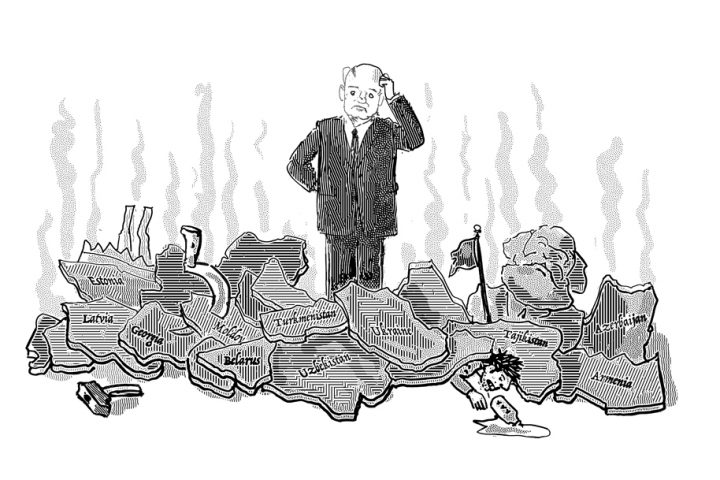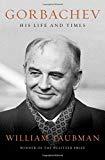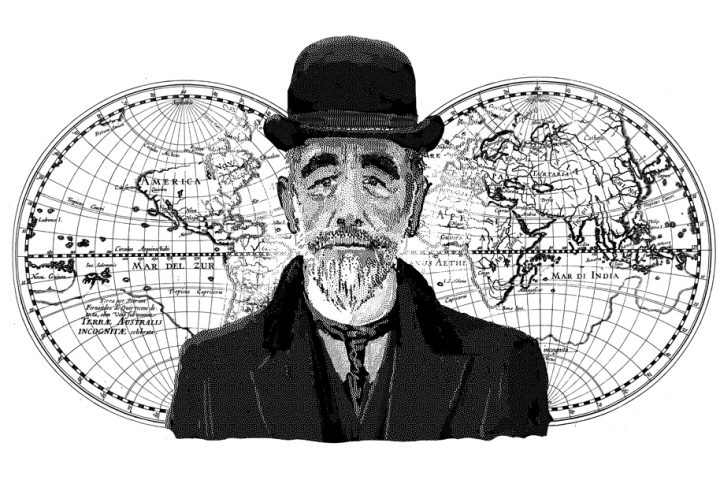Books Reviewed
If there’s a better English-language biography of Mikhail Gorbachev than this one, I’m unaware of it.
An emeritus professor of political science at Amherst College, William Taubman displays a strong affinity for his subject and an odd affection for Soviet officials, including shameless propagandists like Georgi Arbatov and Valentin Falin. He cautions at the outset that “Gorbachev is hard to understand,” but he seems to get the man mostly right. He also ably outlines some unintended consequences of Gorbachev’s actions, above all that his “dream of transforming the USSR came crashing down around him.”
One bothersome flaw of the book is Taubman’s frequent use of the term “conservatives” to describe Soviet officials who resisted Gorbachev’s reforms, and “liberals” for market reformers, freedom-lovers, and anti-Communists. This annoying practice is common among Western progressives, letting them conveniently call the Soviet good guys who took down the USSR “liberals” and the recalcitrant Stalinists who opposed Gorbachev’s reforms “conservatives.” To his credit, Taubman also calls orthodox Communists and Kremlin stalwarts “hard-liners,” which is a much better fit than “conservatives”—though at one spot he laughably refers to anti-Khrushchev forces as “Communist conservatives.”
* * *
A greater flaw involves Taubman’s lack of curiosity about Gorbachev’s religious faith. Taubman describes in detail Gorbachev’s boyhood, his upbringing, his beloved parents and grandparents, his arduous work with his father on a collective farm, his time at Moscow State University, and his meeting Raisa, the love of his life and second-most profiled person in the book. But there is no material on the faith of Gorbachev and his family. The reality is that Gorbachev was secretly baptized by his mother and grandmother, who daringly read him the Bible at the height of Stalin’s rule. His mother, Maria, had been a deaconess in the Russian Orthodox Church. When they were alone, she would surreptitiously bless her son with an icon. Regrettably, not a word of such practices is found in this book.
It’s especially bizarre as there is evidence that Gorbachev has spent his entire life grappling with questions of faith. In March 2008, a British reporter discovered him on his knees for 30 minutes at St. Francis of Assisi’s tomb. “I feel very emotional to be here at such an important place not only for the Catholic faith, but for all humanity,” Gorbachev told the Daily Telegraph. “It was through St. Francis that I arrived at the Church.” (Church? Which church? The article didn’t say.) After praying before the bones of Francis, Gorbachev toured the basilica with the friars. He asked them for theological books to better understand the saint. “His story fascinates me and has played a fundamental role in my life,” Gorbachev said.
How so? Unfortunately, Taubman is silent on this or any similar encounters Gorbachev had. This exclusion is all the more remarkable because Taubman otherwise leaves no stone unturned in his remarkably comprehensive book. He interviewed not only Gorbachev (more than once) but numerous other officials and knowledgeable sources, in both English and Russian. He powerfully captures Gorbachev’s courage, brashness, outspokenness, high self-esteem, temperament, and character—both good and bad—emphasizing his aversion to violence. Here, mercifully, was a Soviet dictator who would not purge, orchestrate mass killings, or otherwise seek to physically harm scores of rivals or dissenters. Stalin would have had the organizers of the August 1991 coup that brought down the Soviet empire shot on the spot, with bloody pictures for his personal photo album.
Taubman does report, however, on the disturbing use of force apparently authorized or allowed by Gorbachev in republics looking to break from the Soviet orbit in 1990-91, such as Latvia, Lithuania, Azerbaijan, and Armenia. People were killed, sometimes by Red Army troops. Taubman treats this even-handedly, but doesn’t resolve the dispute over Gorbachev’s exact culpability. “Much as he abhorred the use of force, Gorbachev justified it this time,” writes Taubman of a deadly case in Armenia, which Gorbachev called “a last resort in extreme circumstances.”
* * *
Gorbachev: His Life and Times capably describes its subject’s struggles throughout his tenure as general secretary (1985–1991) to reconcile his lingering Leninist ideas with his desire to reform the USSR:
Stalin’s crimes and Brezhnev’s “stagnation” mocked Marxist ideals, but Gorbachev thought Soviet socialism could be saved by being “reformed.” It was “only after 1985,” he recalls, “and not immediately then, that I ceased to believe this.”
Gorbachev believed in Lenin long after that. “I trusted him then and I still do,” he wrote in 2006.
Taubman quotes a close friend of Gorbachev, who was amazed to hear that he was voraciously reading all 55 volumes of Lenin’s “collected works.” Gorbachev insisted that Lenin wanted to develop “the living creativity of the masses,” and even a form of “democracy.”
Lenin indeed wrote of “democracy” (see, for example, his The State and Revolution), but, as Taubman concedes, he “was never a democrat in the way that Gorbachev proved to be.” “Many scholars would say Gorbachev was actually misreading Lenin,” writes Taubman. “By now most historians, inside the former Soviet Union and out, blame Lenin for founding the totalitarian system that Stalin perfected.”
Precisely. I had long attributed Gorbachev’s Lenin devotion to ideological brainwashing received in his youth, or mere party-line rhetoric to keep hard-liners at bay. Quite the contrary: as Taubman shows, Gorbachev’s reverence was based on his own reading of the Bolshevik founder, whom Gorbachev hailed as “a great man who played a huge role in the history of humanity.”
* * *
Though Gorbachev’s esteem for the brutal Lenin never wavered, his thinking evolved in other important ways. What Gorbachev believed and seemed to want in 1985 gradually changed, ultimately leading to the unwinding of the Communist system and Soviet state. Looking back, Gorbachev’s penchant for bold action first manifested itself with his openness to Communist Party Secretariat Alexander Yakovlev’s extraordinary reform ideas, submitted privately in December 1985. Yakovlev’s objectives included the Communist Party’s giving up its monopoly status, introducing competitive elections, private property, freedom in personal communications, an independent judiciary, and separation of legislative and executive branches. As Taubman notes, “These weren’t just reforms; they would revolutionize the Soviet political system.”
Gorbachev greeted these intrepid strokes with enthusiasm, though he judged (correctly) that “[i]t’s too early, too soon.” He had to be cautious: “Gorbachev was convinced his Politburo colleagues would move to oust him, just as Khrushchev had been deposed in 1964,” writes Taubman. “And he was probably right.”
Regardless, Gorbachev would oversee a glasnost of freedom of speech, press, assembly, and religion; introduce key market freedoms; and would strip Article 6 from the Soviet Constitution, which had made the Communist Party the only permissible political party. This latter move, noted his aides, was nothing less than a “wholesale change” of the political system. Gorbachev introduced free elections, parliamentary institutions, and brought freedom of conscience to a people who had never known it. He “succeeded in destroying what was left of totalitarianism in the Soviet Union” and “dismantled an empire (or acquiesced in its dismemberment) without the orgy of blood and violence that has accompanied the breakup of so many others.”
But quite unintentionally, in doing these things to preserve the USSR, Gorbachev enabled the regime’s collapse: “the forces he let loose and the people he helped free both at home and abroad overwhelmed him in the end,” writes Taubman. Gorbachev had tried to “give Communism a human face,” but it proved an impossible makeover.
* * *
Hanging over the USSR’s tumultuous final moments was the explosive rivalry and astounding political theater between Gorbachev and Boris Yeltsin. Yeltsin is often accused of not giving Gorbachev due credit. As Taubman shows, however, Gorbachev and his cronies (including Raisa) were vicious to Yeltsin, berating and belittling him. In turn, Yeltsin struck back at Gorbachev not with words but bold physical gestures: walking out, staring down, brooding at him on live television, getting in his face at a podium, sticking his finger at him. High spectacle, always.
By 1991, Communism had shoveled its own grave. The only place for the USSR was the cemetery of history. Gorbachev, notes Taubman, effectively “helped bury the Soviet system by trying to make it worthy of praise, by seeking to make it live up to what he saw as its original ideals.”
The often-puzzling Gorbachev zigged and zagged, based not only on what he could get away with, but also on his own shifts in thinking. Unlike Ronald Reagan or Margaret Thatcher, who came into office with a bedrock of political principles forged through decades of thinking and fighting, much of Gorbachev’s learning came on the job. Though we can debate whether he was a “visionary” (Taubman’s word) or even a great statesman, there is no question that he dismantled what had indeed been an Evil Empire. For this alone, Mikhail Gorbachev deserves praise, as does William Taubman for helping us make better sense of it.




